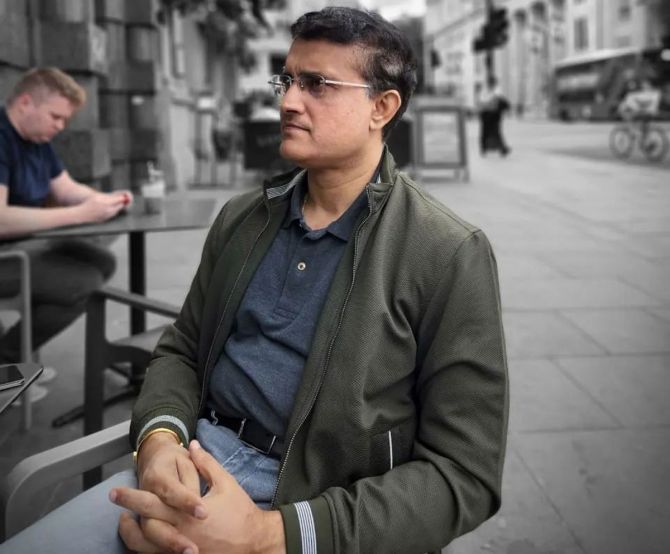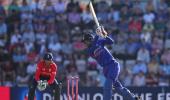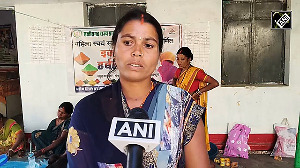
For someone who has always believed in continuity, Sourav Ganguly says having seven India captains in as many months "isn't ideal". But things panned out that way owing to factors that were beyond anyone's control.
As he rang in his 50th birthday with friends and family in London, the BCCI president, and one of Indian cricket's most fascinating characters, spoke on a range of issues including multiple captains, workload management, huge media rights valuation and heading the board.
He also took a trip down memory lane, recollecting his time as a player and captain.
We have had Virat Kohli, Rohit Sharma, KL Rahul, Rishabh Pant, Hardik Pandya, Jasprit Bumrah as India captains and now Shikhar Dhawan for ODIs. Continuity has been affected. What's your take on that?
I fully agree that it is not ideal to have seven different captains in such a short span of time but it has happened because of unavoidable situation. Like Rohit was all set to lead in South Africa in white ball but before the tour, got injured. So we had KL (Rahul) leading in ODIs and then for this recent South Africa home series, KL got injured one day before the series would start.
In England, Rohit was playing the warm-up game when he had COVID-19. No one is at fault for these situations. The calendar is such that we have had to give players breaks and then there have been injuries and we need to factor in workload management also. You got to feel for head coach Rahul (Dravid) as in every series, due to unavoidable circumstances, we have had new captains.
Do you feel the choc-a-bloc FTP calendar is creating a situation where we are seeing players taking far too many breaks due to workload management issues?
Let me tell you something which I have believed all through my international career. The more you play, the better you get and fitter you become. At this level, you need game time and your body becomes stronger as you start playing more and more games.
Yes, the IPL started from 2008 but I would like you to check how much of international cricket we played through our careers. If you compare, the volume of international cricket for Indian team in a calendar year hasn't increased significantly. We played a lot of ODI cricket, so if you see, the number of international match days is almost same.
We now have 10 IPL teams and the BCCI is set to earn more than Rs 60,000 crore in coming years through sale of teams and media rights. Do you fear that there could be compromise in quality of players that we will produce in future as numbers would increase?
Not at all. On the contrary, I would say that the pool of talent in Indian cricket will only increase with passage of time and IPL has shown us the depth of talent we have in this country. You look at the two Indian teams (white and red ball) and kind of players we have been producing over the years.
Let's talk a bit about your time as BCCI president for nearly three years now. How has the tenure been for you and challenges you think that you faced?
When I became president in 2019, it was with the consent of the members associations of BCCI, and it has been a great experience. You get a chance to work for betterment of Indian cricket and a serious opportunity to change things.
Being able to conduct events in two COVID-19 years was challenging, but BCCI as a team pulled off both IPL and domestic cricket (men and women) well.
When I joined BCCI, I already had five years of experience in administration, having worked as (Cricket Association of Bengal) CAB joint secretary and subsequently as president.
You can say in 2014, I was just retired from competitive cricket for two years, having played IPL till 2012, and I was pushed into CAB administration. It was interesting as well as a challenging experience for me.
Did you regret retiring in 2008 season when you were perhaps batting your best in Test cricket having scored runs against England in England, Pakistan (Man oof the Series) at home and a fabulous swansong versus Australia?
I can tell you one thing about myself. I have never had regrets about anything in my life. If I retired after the series against Australia, it was at a time when I was on a high.
And you were talking about Test matches but just would like to remind you that I had scored nearly 1250 runs (1240 to be precise) in 2007 season, when I was dropped from the ODI side. I had 12 half-centuries that year in 50-over cricket.
More than on-field, did you miss the dressing room and being one of the lads?
I don't miss the dressing room. I never missed anything. Nothing stays forever. Everything has to come to an end. I had a great career and it was time to move on and I was glad that I finished on a high. In life, the only constant is to keep moving. Times change, and your role changes.
During the phase between 1992 and 1996 when you were out of the Indian team and then nearly a year during the Greg Chappell era, did you ever feel that external forces were trying to finish your career. Did you feel angry or do you have any grudges about those phases?
I have learnt one thing in my life. Nobody can ever finish your career. If you have the skills, the self-belief and confidence to chart your own destiny, you will do it.
In 1992, when I was dropped post Australia tour, I was very young and had a long time. So I was more focussed on the process of comeback rather than sulking on who said what about me. That is waste of time.
131 at Lord's on debut, 144 at Gabba as India captain or 51 at Johannesburg in your comeback Test in 2006. Which one was more challenging?
Add 87 on a rank turner at Green Park against a good South African attack in this list. But it is difficult to choose one innings. At Lord's, I was making my Test debut, which has its own kind of pressure. At Gabba, I was leading the team and I had to show the way against the Australians.
In Johannesburg, it was very different as I was dropped for nearly a year. I think that surface was very challenging and hardly anyone scored a half-century in that game.
But Kanpur innings would be one of my favourites as it gave me more satisfaction than I would have ever got scoring 160 on a flat deck.
So how does it feel on your 50th birthday?
No special feelings as nothing stops in life.












 © 2025
© 2025